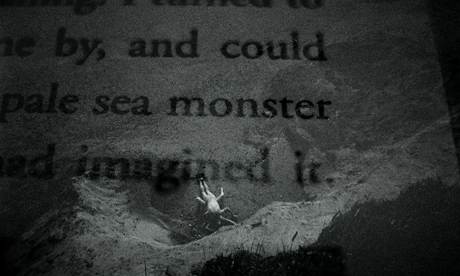Interview: Gareth Evans on Patience (After Sebald)

Otherwordly: Patience (After Sebald). Photograph courtesy of Soda Pictures
“Right now I’m standing opposite Spitalfields Market. I’m looking at a site that is extremely old, and yet all those deeper layerings are obscured. You have to seek them out.”
Gareth Evans is not simply describing his surroundings to me. Instead the art curator is referring to his long-standing interest in the relationship between people and place.
It is a relationship he has explored in numerous projects through the organisation Artevents, culminating in the forthcoming film Patience (After Sebald).
Directed by Grant Gee and co-produced by Evans, the film is inspired by W.G.Sebald’s The Rings of Saturn, a book that shares his fascination with the link between man and his surroundings.
Both the book and the film trace Sebald’s journey by foot along the Suffolk coast. It is “a walk through all sorts of different themes that are prompted by the locations and encounters he has,” says Evans.
“What’s amazing about Sebald’s work is that you can move from a B&B in Lowestoft to the Belgian Congo, to the Voyager space probe in the space of couple of pages. Then you find yourself back in the B&B in Lowestoft.”
It is this sense of escapism via a stream of consciousness that makes the book uniquely un-filmable in one sense, and Evans admits that it was “very challenging conceptually to translate it into a moving image form.”
Despite these obstacles, Patience does an impressive job of capturing the spirit of the book by splicing footage of Gee re-tracing Sebald’s coastal footsteps alongside interviews with an array of artists and authors discussing its themes and continuing influence. The end result is “a hybrid work that sits between aspects of documentary and art film and an embodiment of the book” narrated by film buffs’ favourite, Jonathan Pryce.
For Sebald, identity was an uncomfortable issue and I wonder how far the film goes in shedding light on the writer as an individual. While Evans is keen to point out that the film is not intended as a straightforward biopic, “you can’t help but bring in aspects of the biography, specifically the move from Germany to England.”
He refers to the German author’s “self-imposed exile” from his motherland, an attempt to “find distance from a country where he found himself profoundly compromised in relation to its history. Not only to what it did during the second world war, but how it dealt with it afterwards.”
Like the book, Patience tackles such disparate themes as the holocaust, the legacy of slavery and the space race, all connected by the places that Sebald visits. It is this awareness of the significance of his surroundings that attracted Evans to the idea of making a film about the author.
What excites him about the concept of “place” is that “it’s not somewhere that stays on the page or on the screen, it really does spill out into the world. Everybody has their own story of place. Everyone has their own journey through the world.”
Evans’ own story of place is set in Hackney, a borough where has spent almost his whole life. “Hackney has always been an anchorage point for my relationship with the city, the country and beyond,” he says. “There’s no question there’s a huge energy in Hackney.”
From his base at the Whitechapel Gallery, Evans is perfectly positioned to continue to explore this energy through further films, and help us all find our own place in the world.
Patience (After Sebald) is released by Artevents on Friday 27 January
